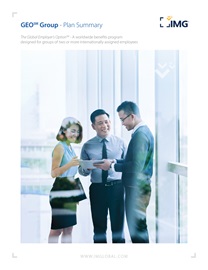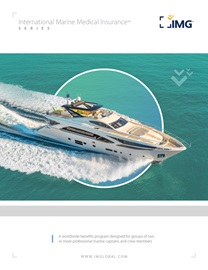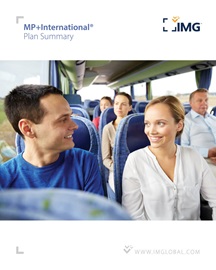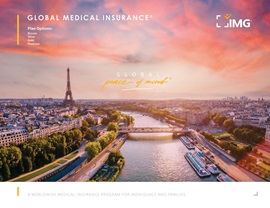Insurance
Choose the plan that meets your needs and spend more time enjoying your international experience not worrying about your insurance coverage.
Find Your PlanWhat type of coverage
do you need?
Travel Medical
Insurance
Temporary coverage for accidents, sicknesses, & emergency evacuations when visiting or traveling outside of your home country.
International Health Insurance
Annually renewable international private medical insurance coverage for expats and global citizens living or working internationally.
Travel
Insurance
Coverage designed to protect you from financial losses should your trip be delayed, interrupted, or cancelled.
Enterprise Services
Meet your duty of care obligations with confidence, knowing your travelers are safe, healthy, and connected wherever they may be in the world.
Show ServicesWhat type of organization do you represent?
Medical & Travel
Assistance
Your travelers can access 24/7 global support should they need medical attention, travel assistance, or medical transport services.
Global Workers' Compensation Case Management
Rest assured knowing you have an experienced team who is committed to reducing your costs, moving your files forward, and serving as an international resource for all your work injury claims.
Security Assistance
Services
Keep your travelers safe, no matter where they are, with real-time alerts and intelligence on safety, health, political, and other global risks.
Insurance Administrative
Services
You’ll have experts to guide you through all things related to your health care plan needs, from enrollment to claim reimbursement.

International Health Insurance
International Health Insurance provides long-term coverage to people living or working outside of their home country, typically for one year or longer. These plans are ideal for expats and their families, individuals with dual residences, multinational employers, and more. Being a global citizen can be an exciting experience, yet one that can pose many potential risks. Your health care abroad should not be one of those concerns. IMG offers revolutionary programs that provide the flexible worldwide coverage you need, backed by the world-class services you expect.
IMG's flagship international medical insurance plan, Global Medical Insurance, allows you to custom build a plan that is specifically tailored to you. The program provides benefits suitable for individuals and families, provides fully portable 24 hour coverage, and gives you the global piece of mind you are seeking. Additionally, the plan was designed to provide long-term, worldwide medical cover that allows you to receive and continue treatment wherever you choose.
Popular Plans
Ideal for Expats & Global Citizens
Group International Health Insurance Programs

The Global Employer's Option - GEO Group
Employer-sponsored group health insurance for internationally assigned employees.

International Marine Medical Insurance
Long-term (1+ year) medical coverage for professional marine crew.

MP+ International
Worldwide employer-sponsored group health insurance for mission groups.
Recent Blog Articles
Ask the Expat: Paul Gordon, General Manager of IMG Insurance Consultancy LLC in the UAE
The United Arab Emirates (UAE) are home to more than 9 million people — but the majority of the country’s residents aren’t UAE nationals. They’re expatriates.
For many of these people, “home” may have a different meaning. However, after five years of living as an expatriate in Dubai, IMG’s Paul Gordon has come to call the UAE home.
Read on to learn how he found comfort, connections and culture shock in his new country.
My Life as an Expat: As Told by Paul Gordon
After living in the UAE for 20 years, my (now) wife, Rebecca, decided to move to the UK to live with me in 2009. She put most of her belongings — including the furniture from her house — in storage, and made the 7,000+ kilometer move to Birmingham, England.
Little did we know that after two years, we would be moving back to the UAE. Rebecca was offered a job opportunity that was too good to refuse, and within two months of accepting the job offer, we were packed and on a plane to Dubai. We were quite lucky that she still had her furniture in storage!
I had mixed feelings when we moved. First, I knew leaving my mom and dad would be difficult. They missed my brother who moved to the United States 15 years prior, and our nan had died two months before. I had also started a business from scratch in the UK 18 years previously, and I suddenly had to delegate the day-to-day running to a manager.
Feeling a bit anxious was an understatement, but I was excited to embrace a new culture in a warm climate. I was also lucky to have the expertise of my wife who had grown up in Dubai. This made the transition to expat life much easier, since Rebecca knew the area and had already established a network of friends and business colleagues.
Importantly, she also understood how basic processes in the UAE worked, such as getting electricity and water. She knew who to call and where to go for these things, which can be very daunting when you’re living in a new country. For these reasons, my experience wasn’t as difficult as it can be for other expats, who move to a new place and have to completely start over.
It took about two years to really get into the comfort of living in Dubai, but it feels like home now. We are raising a 2-year-old daughter who is enrolled in nursery and will be attending school next September. We don’t envision moving for quite a while.
‘Lessons Learned’
When we arrived in Dubai, I quickly realized that not everyone had taken the same driving test! This was my first culture shock – driving on the other side of the road was really an eye opener. My first experience driving on my own came when my wife was admitted to the hospital and I had to drive on the main highway to visit her. I was thrown into the deep end to say the least!
Another surprise was a bit more welcoming. Despite moving to a region where the official language is Arabic, I was pleased to learn that English is the UAE’s language of choice in business. Although understanding Arabic would be an advantage for expatriates, it’s not expected to be spoken.
Additionally, after working and living among people of so many nationalities, I have become increasingly aware of the speed of my speech. Generally, I talk very fast, but now I make a concerted effort to slow down during presentations, meetings and phone calls when I know there may be a language barrier.
Interestingly, my work schedule also changed when I arrived in the UAE. Working here is incredibly intense; you’re never off the clock. People will contact you and expect you to respond almost immediately regardless of the hour — which has actually made it easier for me to communicate with my IMG colleagues in the United States.
The only time periods when business slows down in the UAE are during Ramadan when many people are fasting, and during the summer months when the heat approaches 50 degrees Celsius (about 122 degrees Fahrenheit). Both always have an effect on the amount of work that gets done.
Making Connections
Expat life is a good life. It’s stressful, but you learn to make the most of it, and establishing a network in your new country helps.
Even while I had Rebecca’s friends and colleagues to lean on, I learned quickly the importance of networking in the UAE. One of the most powerful tools as an expat is networking. You meet one person and go to a social gathering, then meet more — and suddenly you build up a network of friends and establish business relationships.
That’s the way business is done in the UAE. In the West, emails and phone calls are sufficient to keep a business relationship running. Here, face-to-face communication is still the most important way to do business. That’s one of the many reasons IMG opened an office in Dubai.
My Biggest Piece of Advice for Other Expats
For those considering becoming an expat, I would highly recommend it.
One of the most important things I have learned throughout this experience — and my biggest piece of advice for others — is to remain open-minded, accepting and tolerant of other people. You can watch the news from afar and get an opinion of a particular country or region, but only when you live there and speak to the people from those countries do you actually understand their way of life. The media will simplify things for their audience; only when you’re here do you understand the truth.
The UAE is a melting pot of cultures, beliefs and languages. Whether you’re an expatriate in the UAE or living elsewhere, you have to be accepting and tolerant of others’ points of view and ideas. In the West, you often form opinions from what you hear in the media, and you don’t get the full picture. I held my own views when I lived in the UK, but when I came here, I became much more open-minded. That’s key to having a successful expat experience in any country.
Do you have questions about becoming an expat? Tweet @IMGLOBAL and use #AskTheExpat!
Want to learn more about becoming an expat or browse expatriate health insurance options? Visit our Expat Health Insurance Plans.
Disclaimer
This is not an offer to enter into an insurance contract. This is only a summary and shall not bind the company or require the company to offer or write any insurance at any particular rate or to any particular group or individual. The information on this page does and will not affect, modify or supersede in any way the policy, certificate of insurance and governing policy documents (together the "Insurance Contract"). The actual rates and benefits are governed by the Insurance Contract and nothing else. Benefits are subject to exclusions and limitations.
